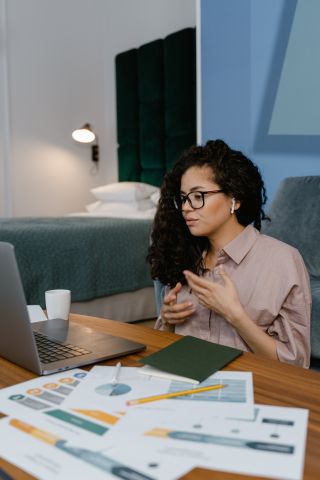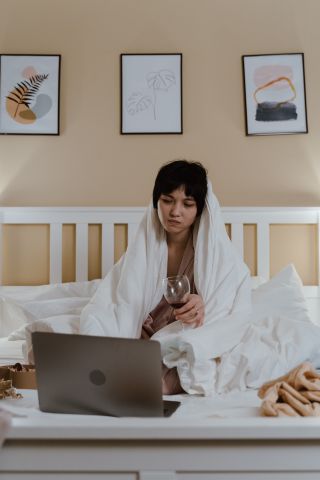Alcoholism
Alcohol and Zoom: A Recipe for Depression?
Focusing on yourself during video calls hurts your mood. Drinking doesn’t help.
Posted March 12, 2023 Reviewed by Jessica Schrader
Key points
- Research has shown that people in a videoconference who spent more time looking at themselves had more negative moods after the interaction.
- Although alcohol use during social exchanges often reduces self-focus and negative moods, it did not have that effect during video calls.
- People who use Zoom may want to consider doing so with the image of their own face hidden.
.jpg?itok=dt-jM_XU)
Thanks in part to the COVID-19 pandemic, virtual social interactions via Zoom and other videoconferencing platforms have become common. Most videoconferencing platforms default to showing you your own video feed during calls. In other words, we tend to spend a lot of time on Zoom staring at our own face. That kind of self-focused attention tends to make people feel worse. In a study published in Clinical Psychological Science, researchers demonstrated that people in a videoconference who spent more time looking at themselves (vs. their online conversation partner) had more negative moods after the social interaction. Further, even though alcohol use during social exchanges typically reduces self-focus and negative moods, alcohol didn’t seem to “lubricate” these online social interactions.
In general, the more you focus on yourself, the more negative your mood tends to be. Self-focus is especially relevant to understanding the emotional outcomes of social interactions. When you’re interacting with others, your self-focus tends to be highly evaluative in nature. In other words, you’re not just focusing on yourself, but you’re focusing on how other people are evaluating you. Do they think you look good? Do they think you’re funny? Interesting? Weird? This kind of self-focused rumination tends to make social interactions less satisfying and to leave people feeling unhappy. In fact, self-focus during social interactions is linked with anxiety and depression.
Many cope with anxieties during social interactions by drinking alcohol. In some ways, this makes sense. Alcohol tends to decrease self-focused attention during social interactions, which can lead to social interactions that improve one’s mood. But in the context of videoconferencing, when you’re presented with a clear image of your own face, the temptation to focus on yourself may be too great to resist, dulling the normally socially lubricating effects of alcohol.
The authors of this new research used a novel method of examining self-focus during an online social interaction. They tracked participants' eye movements, which allowed the researchers to determine when participants were looking at the image of their own face vs. the face of the person with whom they were videoconferencing. Making the method even more interesting, some participants were intoxicated during the task while others were not.

The researchers recruited 246 social drinkers (most were between 21 to 30 years old), excluding any participants with a history of alcohol abuse or any substance use disorder. Each participant was asked to bring a same-sex friend to the study. When they arrived at the study, participants were randomly assigned to complete the study either with their friend or with the friend of a different participant. Thus, half the participants interacted with someone they knew, and the other half interacted with a stranger. Additionally, participants were randomly assigned to either drink alcohol or a control beverage with no alcohol. The amount of alcohol administered was designed to achieve a peak blood alcohol concentration of .08% (the legal limit for driving in most U.S. states). After around half an hour, the participants completed a mood measure, and then were given instructions for the online social interaction.
All participants completed a video call in which they interacted with a partner who was sitting in another room. The videoconferencing screen looked like a typical Zoom setup for a two-person call, with half of the screen showing the participant’s face and the other half showing their conversation partner’s face. Headrests were used to make sure all participants had similar views of their video screens. The participants were asked to engage in conversation about two different topics with the partner: music preferences and their likes/dislikes about where they lived. While they talked, the researchers tracked their eye movements, determining when they were looking at the image of their own face and when they were looking at their partner. After this online interaction, participants completed a second mood measure.
The good news is that results showed that participants tended to spend longer looking at their partner’s face than their own face. This was true regardless of whether the online conversation was with a friend or a stranger. However, evidence also indicated that the more participants focused on themselves during the social interaction, the worse their mood was afterward. And those who were intoxicated during their video interaction were much more likely to focus on themselves during the interaction, and less likely to focus on their conversation partner. As a result, alcohol failed to show the mood-enhancing effects it normally shows during social interactions. Though this study only examined changes in mood over a relatively short period of time, short-term mood states are related to long-term mental health outcomes like depression and anxiety disorders.

Zoom alone has over 300 million daily users. Though videoconferencing is primarily seen as a work-related activity, during the COVID-19 pandemic, Zoom cocktail hours and other alcohol-fueled online social gatherings became more common. This research suggests that those who drink and Zoom are unlikely to get the mood boost they might be hoping for, in part because it’s so hard to look away from the image of your own face. So if you must video conference, consider doing so with the image of your own face hidden. And if you’re looking to reduce “Zoom fatigue,” don’t expect alcohol to help you out.


